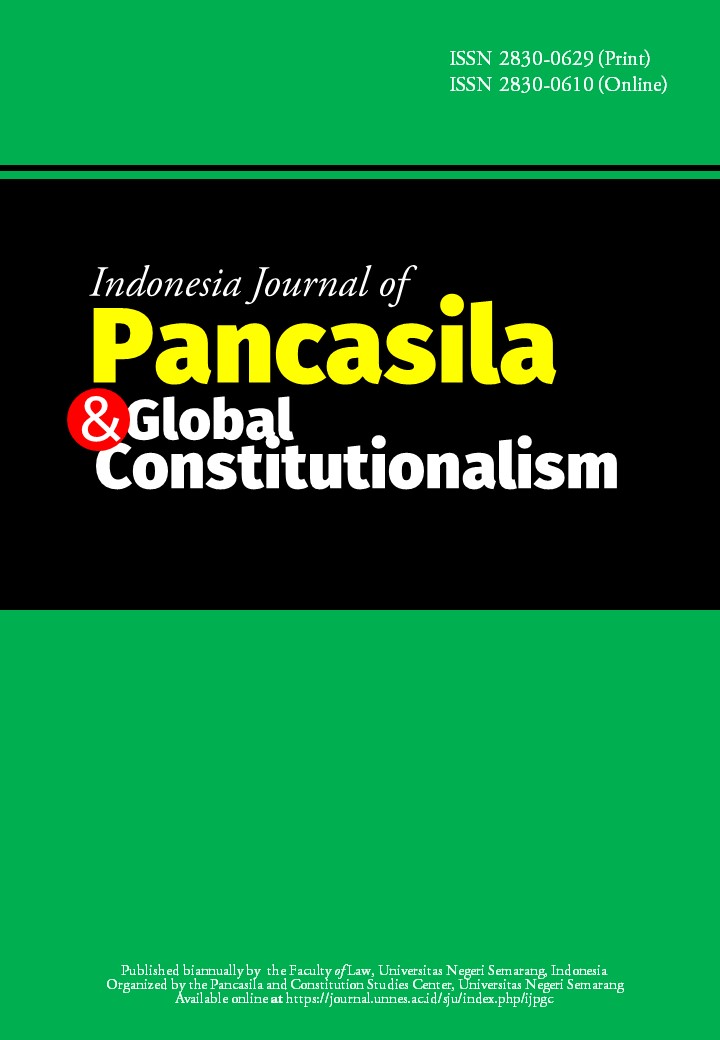Indonesian State System Based on Pancasila and the 1945 Constitution: A Contemporary Developments
Main Article Content
Abstract
In conducting the state implementation, Indonesia as a state needs regulations in accordance with the national cultural values. The values are mirrored in Pancasilaas the spirit of constitutional law which is The Constitution 1945. Indonesian governmental system is presidential; the president is the state chief and the governmental chief. The state power is in three powers, that are legislative, executive, andjudicial powers. Those three powers have relations in sharing the powers. This practice is not the same as the original theory of Montesquei about power divisions. In the implementation, The Constitution 1945 has supporting institutions. They are People's Consultative Council, House ofrepresentative, President, Supreme Court, Constitutional Council, Judicial Commission, Financial investigator, Police, and the Army.
Article Details

This work is licensed under a Creative Commons Attribution-ShareAlike 4.0 International License.
References
Ceswara, Dicky Febrian, and Puji Wiyatno. "Implementasi Nilai Hak Asasi Manusia dalam Sila Pancasila." Lex Scientia Law Review 2, No. 2 (2018): 227-241.
Effendi, Syafnil. "Konstitusionalisme dan Konstitusi Ditinjau dari Perspektif Sejarah." Humanus 10, No. 1 (2011): 73-81.
Fitriana, Mia Kusuma. "Peranan Politik Hukum dalam Pembentukan Peraturan Perundang-Undangan di Indonesia Sebagai Sarana Mewujudkan Tujuan Negara (Laws and Regulations in Indonesia as The Means of Realizing the Country’s Goal)." Jurnal Legislasi Indonesia 12, No. 2 (2018).
Hidayat, Arief. "Revitalisasi Ideologi Pancasila dalam Aras Global Perspektif Negara Hukum: Sebuah Pandangan Indonesia Terkini." Seminar Nasional Hukum Universitas Negeri Semarang 2, No. 1 (2016): 1-6.
Mukaromah, Siti Afifatul, Ari Gusmawan, and Jeremiah Munandar. "The Lunge of Global Ideologies: The Challenges of Pancasila Ideology Education in the Middle of Global Existence in the Era of Globalization." Jurnal Panjar: Pengabdian Bidang Pembelajaran 4, No. 1 (2022): 1-30.
Nurcahya, Mila Andriani, and Dinie Anggraeni Dewi. "Implementasi Nilai Dasar Pancasila Dalam Upaya Mewujudkan Tujuan Negara di Kehidupan Sehari-Hari." Edukatif: Jurnal Ilmu Pendidikan 3, No. 3 (2021): 631-639.
Putri, Fannia Sulistiani, and Dinie Anggtaeni Dewi. "Implementasi Pancasila sebagai Sistem Etika." EduPsyCouns: Journal of Education, Psychology and Counseling 3, No. 1 (2021): 176-184.
Sartono, Kus Eddy. "Kajian Konstitusi Indonesia Dari Awal Kemerdekaan Sampai Era Reformasi." Humanika, Kajian Ilmiah Mata Kuliah Umum 9, No. 1 (2009).
Soemarsono, Maleha. "Negara Hukum Indonesia Ditinjau dari Sudut Teori Tujuan Negara." Jurnal Hukum & Pembangunan 37, No. 2 (2007): 300-322.
Suhardjana, Johannes. "Supremasi Konstitusi Adalah Tujuan Negara." Jurnal Dinamika Hukum 10, No. 3 (2010): 253-264.
Wijaya, Arif. "Demokrasi dalam Sejarah Ketatanegaraan Republik Indonesia." Jurnal Hukum dan Perundangan Islam 4, No. 1 (2014): 137-158.
